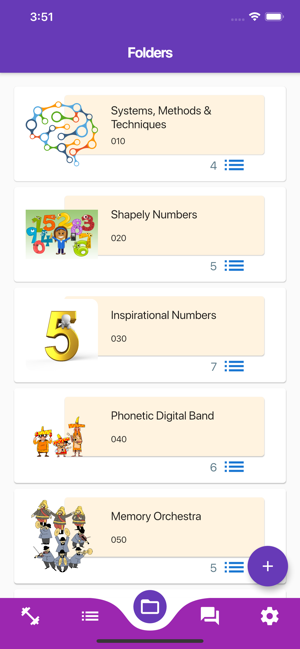價格:免費
更新日期:2020-05-18
檔案大小:65.2 MB
目前版本:2.2
版本需求:系統需求:iOS 12.0 或以後版本。相容裝置:iPhone、iPad、iPod touch。
支援語言:英語

Course
1. Systems, Methods & Techniques
2. Shapely Numbers
3. Inspirational Numbers
4. Phonetic Digital Band

5. Memory Orchestra
6. Memory Parade
7. Home, Sweat Home
8. The World is a Stage
9. My Body, My Shrine

10. Numbers, Numbers Everywhere
11. I Got a Little List
12. A Date for All Occasions
13. Know Face, No Name
14. 10 Memory Lane

15. Left, Right, Right, Right
16. Playing Cards
Gym
1. Numbers (Random, Card, Crypto)
2. Lists (Nouns, Adjectives, Pairs)

3. Dates (Modern, Middle Ages, Ancient)
4. Names & Faces (52)
5. Playing Cards Speed (manual or auto 3,6,9 secs)
6. Playing Cards Shuffle (Stack, Tinder, Radial in Horizontal or Vertical)
Toolbox

Major Number System (1-19)
Major Number System with Speeds (1,2,3 seconds)
Major Number System with Flip Cards (1-19)
Memorising new information, in any form, is usually achieved by one of the following systems:
* The Chain; where each piece of new information is linked to the next.

* The Peg; where each piece of new information is ‘pegged’ (attached) to an already established series or list.
* The Framework; where each piece of new information is positioned in a predefined section within a framework.
Virtually all memory techniques are intrinsically similar to directing and producing your own short memory movies. The basic theme is that you have two components within a film frame: a picture or character and another picture or character. The first picture/character is called a Peg, and the second is called ‘new information’. The movie contains the (inter)actions of the two. Your aim is to create the most exciting memory movies, so the audience (you) can remember them for a long time to come.
The memory method used in Memory Gym is called ‘Lights, Camera, Action!’, the words in film making when a new scene is to be filmed. The reason for the name is that advancing memory to the limits is essentially about making movies, memory movies.
The memory movie has 2 stars in the leading roles:

In the Peg system, the Peg and the picture Object.
In the Framework system, the Division and the picture Object.
The human brain has a phenomenal capacity to remember images; far greater than abstract numbers or textual words. Hence, the basic theme of all memory systems is to represent each new piece of information with a pictorial, visual Object and then link the Object with the next Object (Chain), a Peg or a Division (Framework). This link is achieved by creating a memory movie, starring the system component and the new Object.
As per Aristotle “We are what we repeatedly do. Excellence, then, is not an act, but a habit”. With Memory Gym, you have a complete programme with 16 chapters and specific real-world exercises, which will help transform your powerful memory into a habit.

